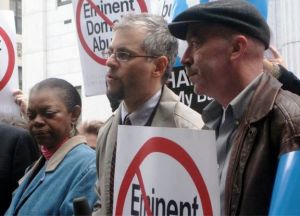After Rowdy Atlantic Yards Hearings, a Senate Bill to Punish Heckling
By Eliot Brown November 23, 2009 11:21 pm
reprints Back in May, at a state Senate hearing on the $4.9 billion Atlantic Yards project planned for Brooklyn, State Senator Velmanette Montgomery started to launch into criticism of a fellow senator, Marty Golden.
Back in May, at a state Senate hearing on the $4.9 billion Atlantic Yards project planned for Brooklyn, State Senator Velmanette Montgomery started to launch into criticism of a fellow senator, Marty Golden.
Mr. Golden, a Republican and Atlantic Yards supporter (unlike Ms. Montgomery on both counts), had arrived late at the hearing at a Pratt Institute auditorium, and caused a commotion as he arrived, with scores of union workers applauding and drowning out the hearing.
Ms. Montgomery tried to scold him for disrespecting her in her own district, but she was unable to utter more than a few audible words. Despite holding a microphone to her mouth, the union workers, on hand to show support for the controversial project that eventually might promise work for them, booed, yelled and blew loud whistles until the senator stopped talking.
Ms. Montgomery apparently was not amused.
On Friday, she introduced legislation in Albany that seeks to cut down on such outbursts, barring the employer of anyone disrupting public meetings from bidding on any public contracts for five years, and allowing the state to drop those contracts still in progress.
What’s a disruption?
From the bill text:
Disorderly, contemptuous, or insolent behavior, committed during a public hearing, in its immediate view and presence, and directly tending to interrupt its proceedings.
“It should have been done a long time ago,” said Jim Vogel, a spokesman for Ms. Montgomery. “The bill isn’t just about Atlantic Yards … this has happened across the state, and across the country.”
On the face of it, the bill seems to be quite the far-reaching step for government to take toward anyone at a public hearing, an issue that doesn’t come up all that often. It also seems tailored to muzzle the groups which support development projects, leaving little to be done about project opponents, who have little or no need for state contracts, but can be equally rowdy (although they tend not to have the numbers of unions).
It also seems extraordinarily difficult to implement and enforce, and it’s hard to see how it would actually work in practice, if it were to actually pass the Legislature.
Still, the disruptions caused by large organized groups of supporters, often unions but not always, are by no means limited to this one Atlantic Yards hearing.
ebrown@observer.com



